Richard Falcon is the founder and executive director of Teatro Nagual. Falcon founded the theatre with a mission to create innovative, artistic, educational programming that embodies the core values of Cesar Chavez and foster service to others. Fran Astorga is a playwright and founder and core leader of In the Margin, a nonprofit that works to uplift marginalized voices in the arts and beyond. The two California-based multi-hyphenate artists talk about the need for inclusive spaces that led to founding their own companies, the roadblocks they've pushed against, and the legacy they hope to create as part of the teatro field.
Ripples of Legacy in California’s Latinx Theatres
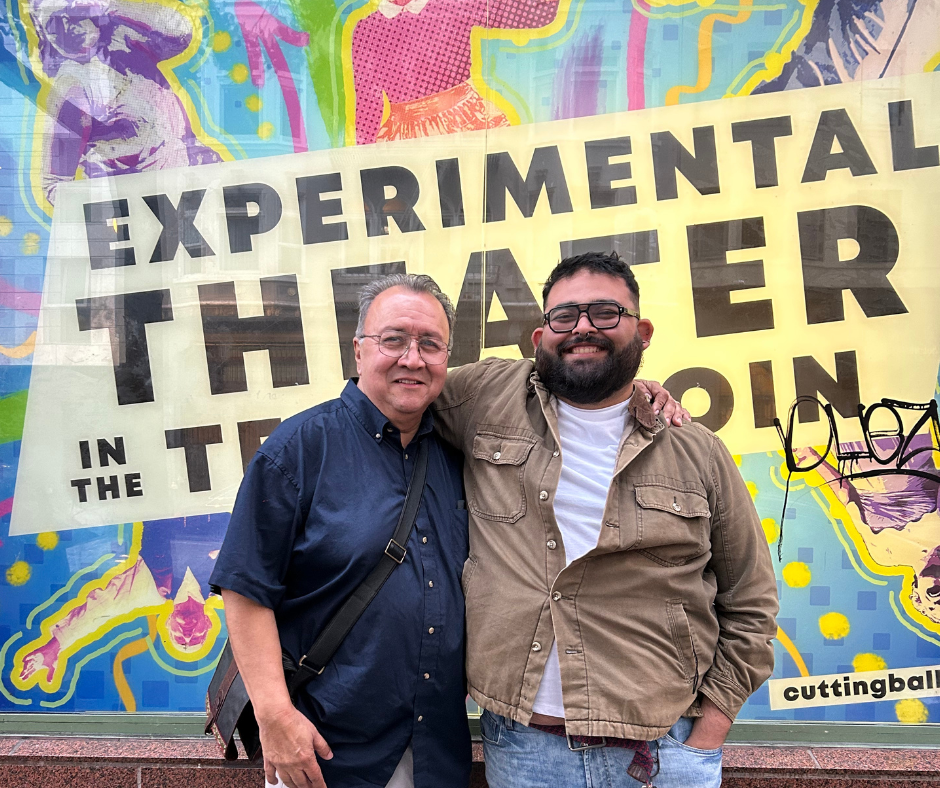
Richard Falcon and W. Fran Astorga at CuttingBall Theater in San Francisco, California for the closing of Fran's world premiere production of Exhaustion Arroyo: Dancin' Trees in the Ravine. Photo by Chris J. Hayes.
Richard Falcon: I am the founder and artistic director of Teatro Nagual here in Sacramento, California, on the land of the Miwok and Nisenan tribes that have been here before us. We are primarily a Latinx theatre company focusing on telling our stories and bringing forward social justice and education.
W. Fran Astorga: And I'm calling in from Ramaytush Ohlone land. I'm currently the conservatory manager at American Conservatory Theatre and a core leader and co-founder of In the Margin, an organization dedicated to uplifting marginalized voices in our community within the arts and beyond.
Richard: What was that particular moment where you knew you wanted a career in theatre?
Fran: I started playwriting immediately for my drama department in high school. I wrote La Piñata es Para Siempre, which was mostly in Spanish with some English. There was a moment when my drama teacher, Julie McBay, literally pulled me aside and was like, "Maybe you should pursue a career in this." I was like, "Oh, you're right, maybe I should consider this."
Richard: Wow, that's amazing. It's so wonderful to have an educator who saw that in you to encourage you.
Fran: The big question became, “How do you make career in theatre?”
Richard: Wait, we have careers in theatre?
Fran: Right. I mean, it's still a question that persists, but I don't think it's different from any other field.
Richard: Did you always want to produce and direct? Did you have a desire to also perform?
Fran: I love playwriting, directing, and producing. Performing, I love doing as well, but it is very challenging for me to continue embodying the same character for months. It takes a special type of stamina. Helping generate opportunities for artists is more fulfilling for me.
Richard: I hear you. I was very introverted, and I still consider myself an introvert in many respects, but it wasn't until some friends from high school… we had a very diverse high school, and for the time period, very progressive in its way back in 1971 through 1975, and my friends introduced me to theatre.
I came from such a dysfunctional household, so it became my escape. I honestly did not know my culture. We were assimilationist. We had our altares, and I still see visions of my sister dancing to her cumbias music in her bedroom, but we were to be Americans.
So because things were so dysfunctional at home, theatre allowed me an opportunity to become things that I wasn't. It almost became a way of therapy for me.
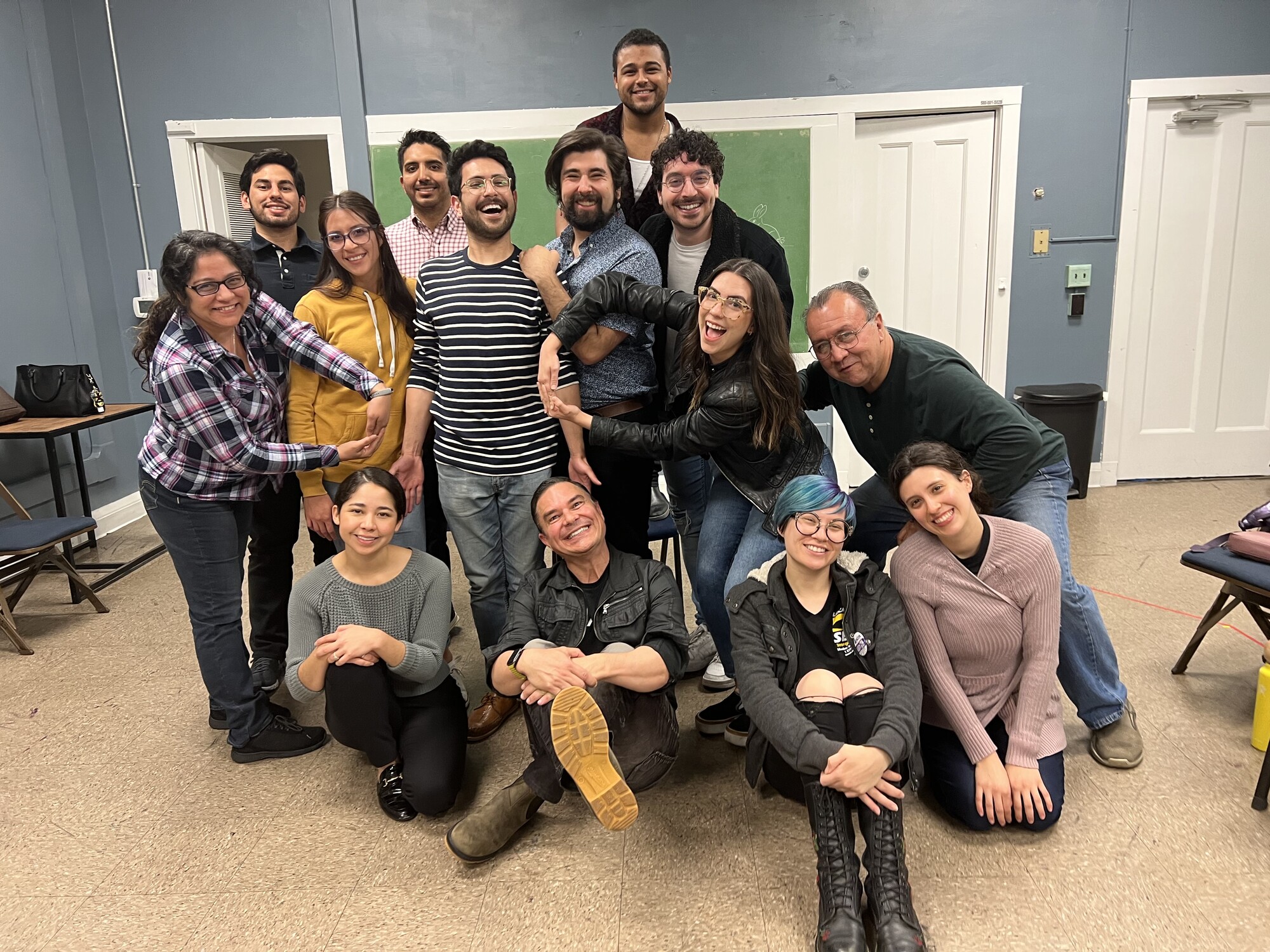
The company artists of Teatro Nagual.
Fran: Did that draw you to Latine work, too?
Richard: No. Much in the Chicano movement was happening during that time period, and my mother would not allow me to be part of the movement. They did not understand Chicano or Chicanismo or anything like that. They would say, "You are American."
It wasn't until I created Teatro Nagual that I said, “I'm going to go back to my roots.” I had wanted to be an actor, but I never thought about being a director or an artistic director until Ray Tatar introduced me in 2006 to the play that launched us. It was called Let the Eagle Fly. It's a beautiful musical written in the style of American musical theatre about the life of Cesar Chavez and the creation of the United Farm Workers. For the first time, I was a part of something that was people of color. We didn't call ourselves people of color or artists of color back in 2006, but it was marvelous to see it.
Fran: Just within the last five, six years, language has evolved so much. Looking at equity, diversity, and inclusion (EDI) through the academic lens, the language has been there, but it hasn't been as open to the public. So it has been nice to provide it as a tool for people outside of academia to speak about our experiences in a way that is specific.
Richard: It has been a journey.
Fran: How have you built or found community?
Richard: In 2018, I joined United Latinos, which is a community-based organization that focuses on civic engagement, education, and, more recently, environmental justice. As I started plugging into them and the advocacy that they were doing for Latinos specifically, I got to meet people who were being marginalized, people who were being systemically impacted by rules and regulations and governance. When I was finding those people in the community and working to better their lives, they also were like, “Oh, wait, you do arts? My cousin does this. My uncle does this. My tía does this. My kids need this.” It opened up so many opportunities.
How have you found community?
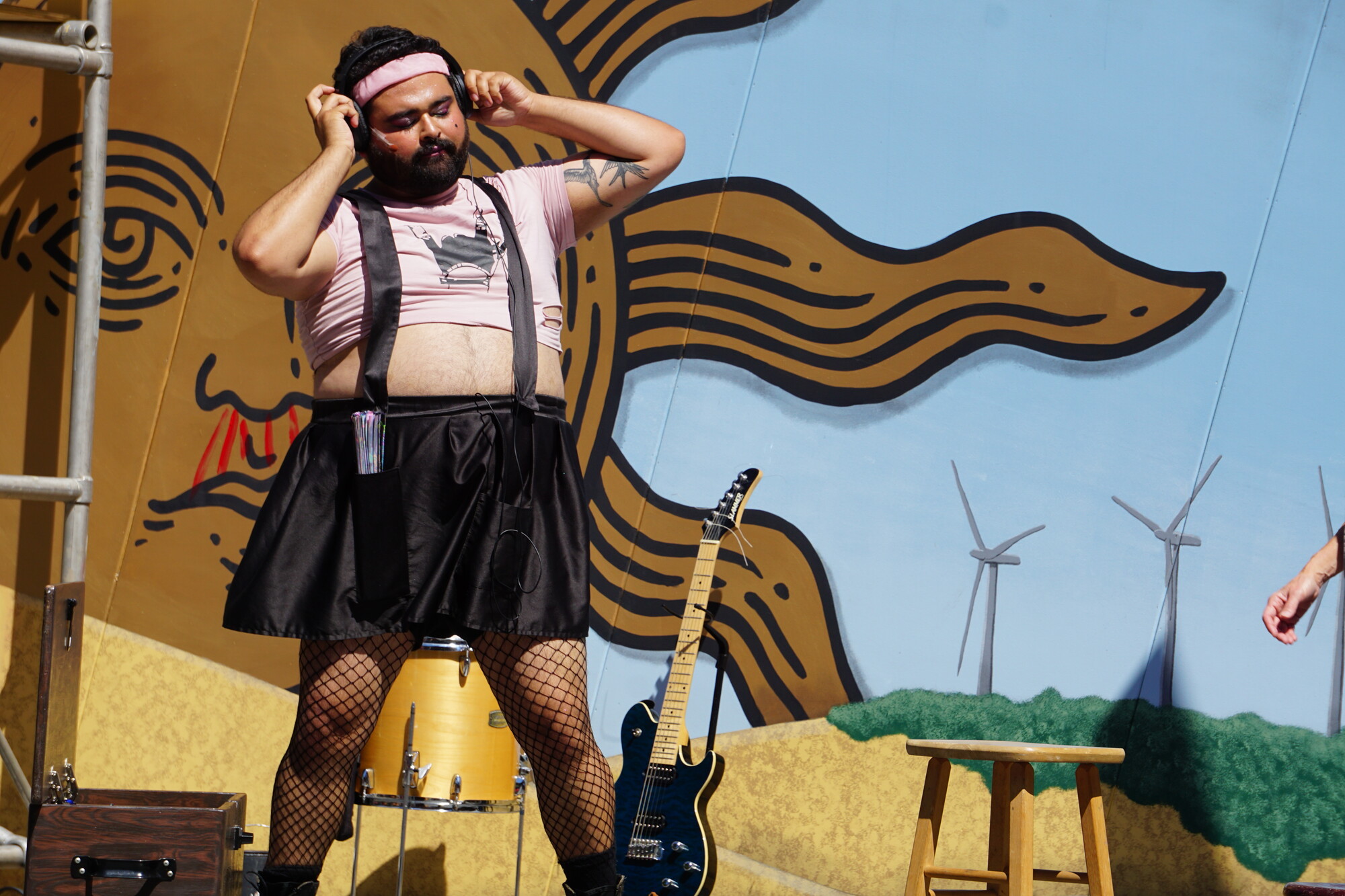
W. Fran Astorga as Margaret in Much Ado About Nothing by William Shakespeare at the San Francisco Shakespeare Festival. Directed by Shannon R. Davis. Scenic Design by Neal Ormond. Costume Design by Marina Polakoff. Music Composition by Richard Jennings. Movement Direction by Chelsea Gregory. Stage Managed by Rebecca J. Ennals. Photo by Jay Yamada.
Fran: My first language was Spanish, and I come from an immigrant community where all the adults in my life were monolingual Spanish speakers.
In the Margin was founded because I saw the issues within my university and how it was treating students of color and queer students. I studied abroad and I saw what education could be and was like, “Oh shit, I’m not treated a certain way here.” So I led my senior class in discussions about EDI. We learned that language together and presented our concerns to the student body and the faculty in a letter, like the We See You White American Theatre letter, but in 2015 and 2016.
No one was prepared for that. There wasn’t a national conversation around it, so the faculty response was negative. They reprimanded us. Even though we had the best intentions, communicating to someone that they're causing harm is a hard conversation for that person to receive.
It was a few years of not the best interactions. Unfortunately, we had to really phrase and present how we're being harmed in a way that is almost palatable. We can't be angry; we just have to state facts.
Now I'm trying to learn how can we show rage while contextualizing it in a way that can be consumed by a person who causes harm. We should have the right to be angry about these things and educate in the process.
The conversations are hard, and it's challenging to find appropriate actions. But it's not impossible. You need creativity. Who is more creative than a theatre group or a collective of artists to help lead those conversations toward a better understanding of the dynamics at play?
How do we find the opportunity and the bridge, as we talk about EDI, to make sure that we are including all of the Latine countries that are out there?
Richard: Who were some of your mentors, Fran?
Fran: One mentor is an improv legend named Amy Seeley, who is great at teaching students how to find themselves in their work. Dr. Caroline Mercier, my faculty advisor in undergrad, similarly encouraged students to pursue multiple interests to find what fits them best, and she diligently advocated for students. I would also include all my chorus directors because they all seem to double as life coaches, especially Dr. Daniel Afonso. He continues to be a role model of queer Latine excellence, dedication, and artistry.
Then of course, my mom, Adelaida Astorga Sanchez. She's a single, immigrant parent who worked the land to raise her kids, so she is a huge influence. I always refer back to the question, "Would my mom feel comfortable here?" If the answer is "no," then we need to work to be more inclusive and accommodating to the people in this space.
Richard: Let me ask you a question, Fran, that I have struggled with. Many of the stories and artists I connect with, just because of who I am, are probably more Mexican stories, yet our Central American, South American, and Caribbean siblings who are part of my organization sometimes feel left out. How do we find the opportunity and the bridge, as we talk about EDI, to make sure that we are including all of the Latine countries that are out there?
Fran: Something that I add to the acronym EDI is an “M” and an “A” to make it “MEDIA.” The “A” is for accessibility, because as someone who's neurodivergent, that looks different for me. Making it a plan to make space for that is essential, whether it's for your body or your mind or even your spirit.
But then the "M" is about the importance of approaching all of EDIA through a multicultural lens. Because the way I think about EDIA as an American is really different from how I think about EDIA as a Mexican or as a queer person. There are different challenges within each of the cultures. So multicultural to me means different cultures by region, but also by an individual person. Through my identities, how do I create space for everyone involved in the conversation to examine it through their different lenses?
I see a lot of value in a multicultural approach because we have a lot of things to work through as humanity.
International intergenerational dialogue within an affinity group is important and a good way for us to also learn how stories have been told within our community and how they're going to be told within our community.
Richard: Don't we, though? Even within, like you said, the various Latine cultures… Are we Latino, Latina, Latinx, Latine, Chicano, Indigenous?
Here within Sacramento, too, we struggle with our Latinos intergenerationally. I mean, like I said to you, my mom would not allow me to join the movement. "You Are American." Now, I hear people in our community say, "What's this ‘Latinx,’ ‘Latine’ stuff?"
So how do we build those bridges, Fran, from my generation to your generation?
Fran: I think through intergenerational art making—
Richard: I love that.
Fran: Involving young artists with older artists. International intergenerational dialogue within an affinity group is important and a good way for us to also learn how stories have been told within our community and how they're going to be told within our community.
Richard: Let's get some of that intergenerational art together. I have to start thinking about what Teatro Nagual can do with In the Margin, and I think that would be amazing.
Fran: I think we are already doing that because my play, Exhaustion Arroyo, is being produced, and Pano Roditis is taking part. You recommended Pano to originate the role of Chio, so it feels to me like Teatro Nagual is being represented by Pano.
Richard: Pano is amazing. He is passionate about social and environmental justice and became a trusted director and producer for Teatro Nagual. When I was asked by B Street Theatre’s artistic director, Lyndsay Burch, for someone to perform in the staged reading of Exhaustion Arroyo for In the Margin, Pano was a first choice. I'm glad he is working with you.
And thank you for saying that because that's important to me. As I do the work that I do in the community organizing, it has helped me to also start organizing artists. We do have to organize ourselves as artists so that we can work together and stop competing with each other. There's room for all of us at the table—all of our stories, all of our art disciplines.
Someone shared a phrase about theatre with me, and it has stuck with me. They said it is a place to demonstrate and hold socially unacceptable behavior in a socially acceptable manner.
Fran: I like that. What about the funding of that socially unacceptable behavior?
Richard: I have been trying to find solutions for funding sources for predominantly white institutions (PWIs) and the granting processes and applications that work in systemically racist ways. Many of our artists do not know how to navigate that, and as a result they stay underfunded. They are not able to produce their works, and it is not equitable. Part of what we have been trying to do is to change that here within Sacramento, to address those inequities so that we can meet artists where they are.
As I do the work that I do in the community organizing, it has helped me to also start organizing artists.
Fran: For In the Margin, we have had more success with grants when we were fiscally sponsored. I think that's because our application came with a name of a more trusted white institution. Now we're doing more work that we are producing with our own vision, and we haven't gotten funding because there isn't confidence in us.
Richard: Our fiscal agent is the Latino Center of Art and Culture, and we've been somewhat successful in our grant applications and endeavors with them as our fiscal sponsor. We are now filing for our own nonprofit status, which we are excited about. What I'm seeing, at least on my end, is many of the opportunities that were there for fiscally sponsored organizations seem to be moving away towards actual nonprofit organizations. We've missed out on a couple of opportunities as a result.
How have you all been faring with your general operating expenses, Fran?
Fran: All we're missing is the money, because we're doing work. We have hours and hours logged. We're meeting our goals in the sense of generating paid work for artists, but that's temporary. It would be great to get funding for the more consistent work that our core leadership does. But the challenge is, again, building that trust with granters.
The scope of our work is extensive considering that we're not getting paid. I hope it's just a matter of time. It's a labor of love, but that can't be sustained.
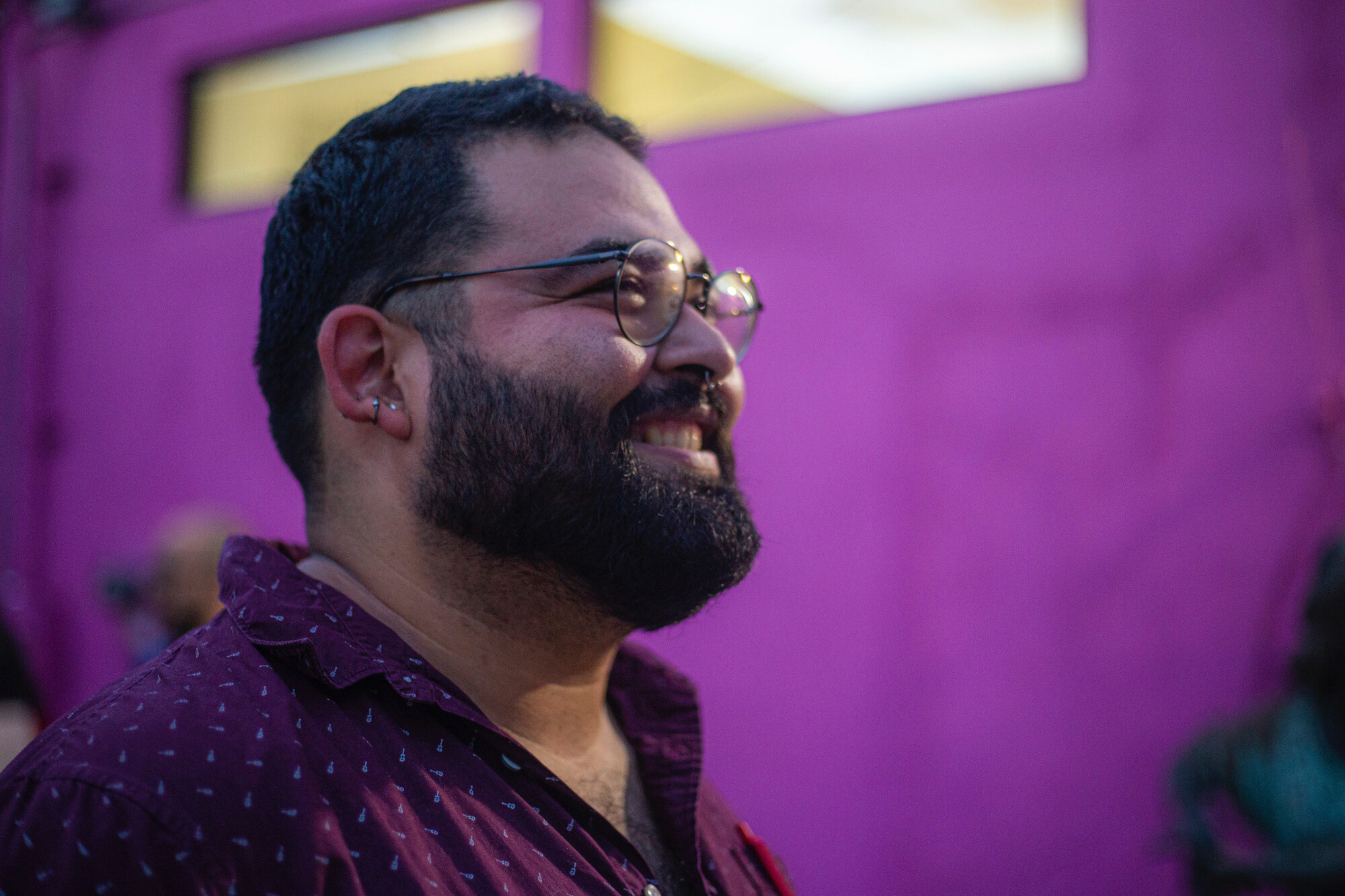
W. Fran Astorga as a resident playwright for the Latinx Theatre Commons 2022 Comedy Carnaval. Photo by Jean Carlo.
Richard: Artists are resilient people. We are very resilient. We are very intelligent. We are super driven.
I will share, for those that don't know me, that I’ve been involved in the corporate side of business for a long time. I grew up in white American corporate areas, and I lost everything in 2019. Someone said, "Do you want to fight it, because it'll be in court for years and years, or do you just want to move forward?" I said, "I'll just move forward."
It was my lovely wife, Barbara, who said, "Well, you always kept saying you wanted to build this theatre company. Do you think you could do it?" I was like, "Yes."
That I have been able to do what I do and offer the opportunities and meet people like you has been a journey. I'm planning to be around for a while, but that's why I still bring the young people along the journey with me. Because someday I won't be there to do it, but I want the work to continue.
Fran: Yeah. A word that has followed me is the word “legacy.” The document that I drafted in college with the help of the initial In the Margin cohort was called the Legacy Letter. It's a document that students today still reference. They've added to it. They keep adding their own versions of “here are ways our education isn't aligning with us.”
Artists leave a legacy that maybe isn't easily as tracked, but it does have impact. I'm reminded of it every now and then, the ripple effect, and it's really powerful.
Richard: That ripple effect can be pretty powerful and eventually turn on into a wave. I met Dolores Huerta numerous times and got to know Dolores, and I remember something she said in an interview where she said there is a new movement, and this time Latinos will be on the front of that movement.
It's through the work that we continue to do—whatever we identify as—for our community and our people and our artists, that we become part of that movement strengthen it.

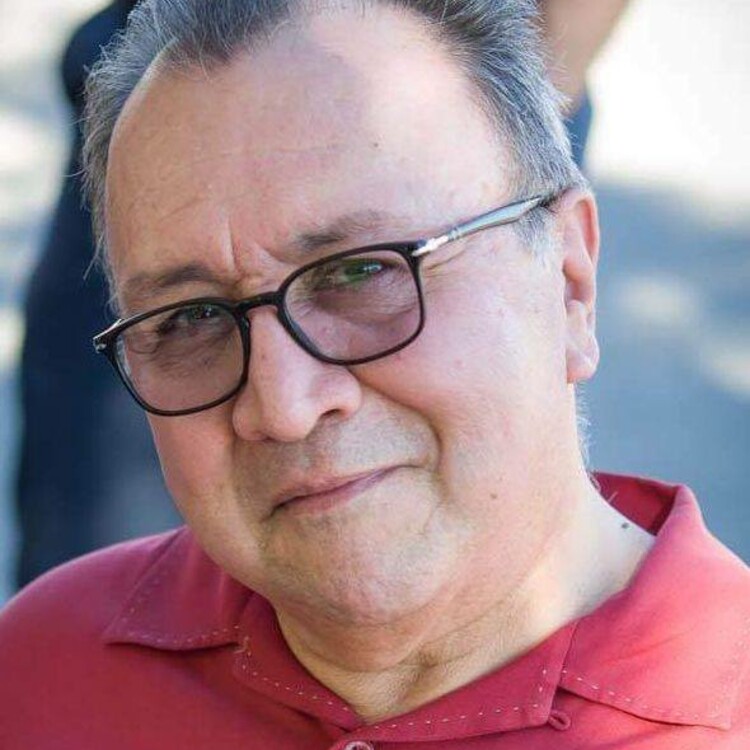
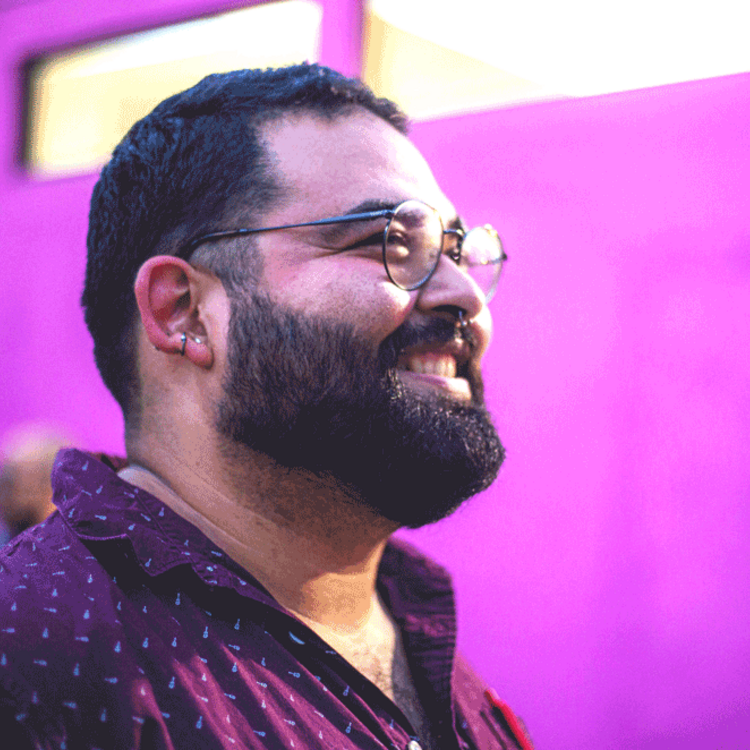
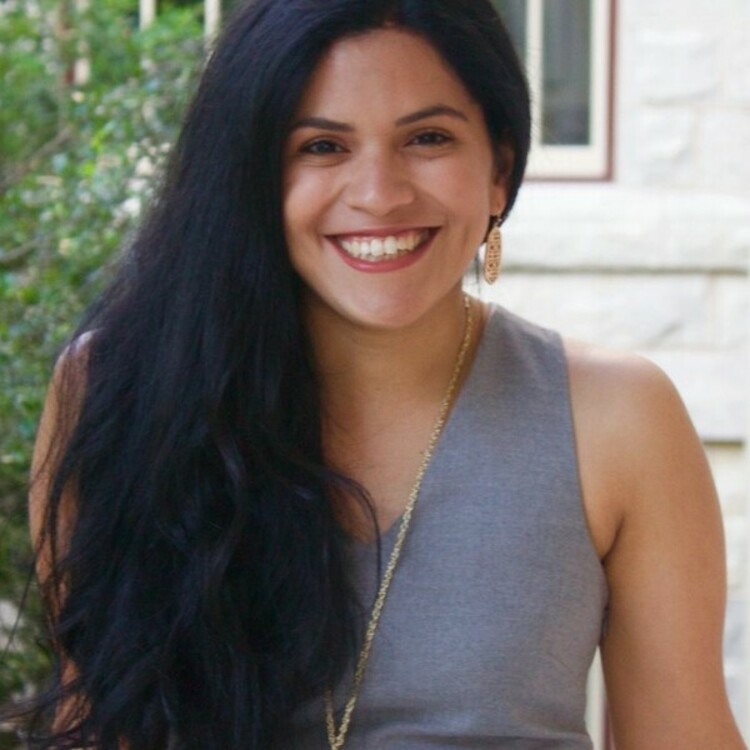
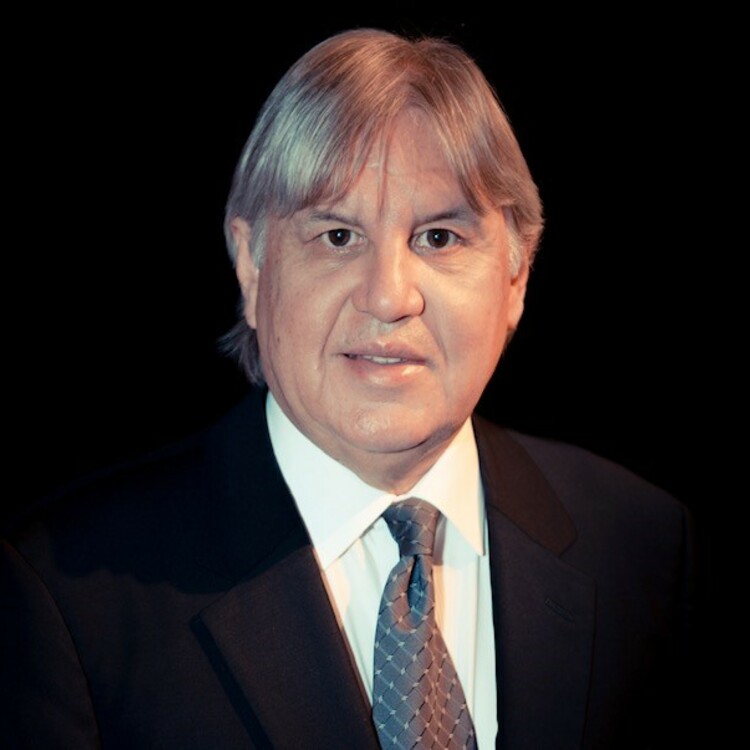
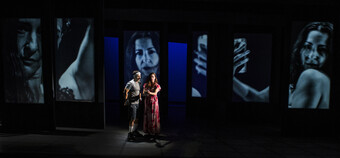


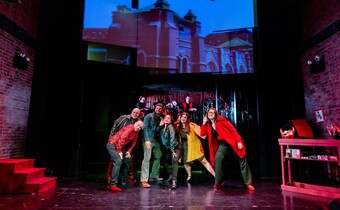


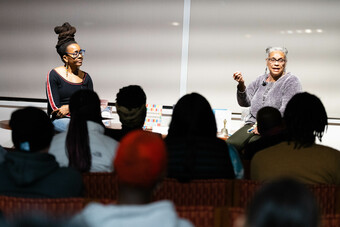


Comments
The article is just the start of the conversation—we want to know what you think about this subject, too! HowlRound is a space for knowledge-sharing, and we welcome spirited, thoughtful, and on-topic dialogue. Find our full comments policy here